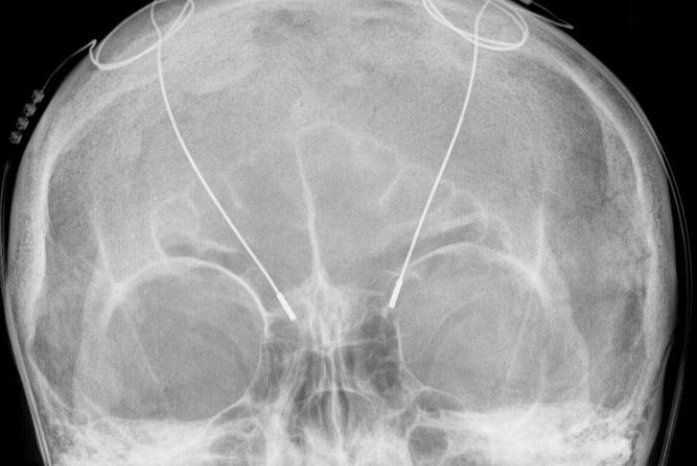Deep brain stimulation probes are shown in an X-ray of the skull. A recent trial showed that Alzheimer's patients older than 65 may receive the most benefit from deep brain stimulation. Photo by Hellerhoff/
Wikimedia Commons
June 19 (UPI) -- Alzheimer's patients older than 65 benefit the most benefit from deep brain stimulation, according to findings from a recent phase II clinical trial.
Researchers at Toronto Western Hospital's Krembil Neuroscience Center for two years have been studying the stimulation of the fornix, a bundle of nerve fibers in the brain between the hippocampus and the hypothalamus. The findings, published this month in the Journal of Alzheimer's Disease, are an analysis of follow-up data during the second 12 months of a 2016 clinical trial.
"We are encouraged by these findings as they continue to help us identify who will benefit most from DBS to treat Alzheimer's disease and learn more about this illness," Dr. Andres Lozano, a neurosurgeon at the Krembil Neuroscience Center and principal investigator on the study, said in a press release.
For the study, 42 patients who were at least 65 years old and have mild Alzheimer's disease were enrolled in a randomized, double-blind multi-center trial. They were implanted with deep brain stimulation electrodes directed at the fornix -- a bundle of nerve fibers in the brain.
In the first 12 months, patients were randomly assigned to the "on" or "off" stimulation group after their procedure and monitored. Then all patients had their electrodes turned on, and were followed for another 12 months.
During the second 12-month phase, researchers observed similarities with the first phase.
They found that while there were no overall differences in cognitive outcomes between the groups, participants older than 65 appeared to experience a slower progression of Alzheimer's than those who were younger -- regardless of when their device was turned on.
The researchers plan to launch a Phase III, multi-center international trial that will study of the effects of DBS-f in 140 patients older than age 65.
"The next phase of our research will help determine whether this observed benefit is something we continue to see in this age group," Lozano said. "If it does, this could potentially give us a treatment for mild late-onset Alzheimer's disease."
Deep brain stimulation is being considered by other researchers as well -- doctors at Ohio State University are experimenting with an implanted "pacemaking" device in three Alzheimer's patients as part of deep brain stimulation therapy.
The therapy is also being used by patients with Parkinson's disease to help overcome tremors, rigidity, stiffness, showed movement and walking problems, according to the National Institute of Neurological Disorders and Stroke.
"With so few treatments available and the incidence of Alzheimer's only expected to increase, we really need to fully explore all treatments that seem to be of benefit to patients," Lozano said.















